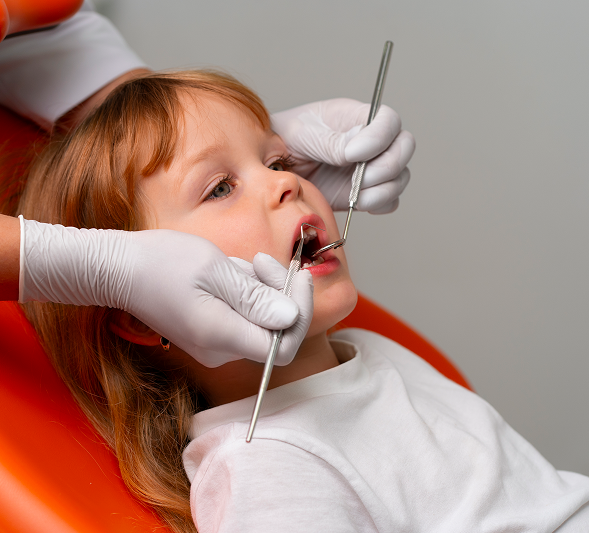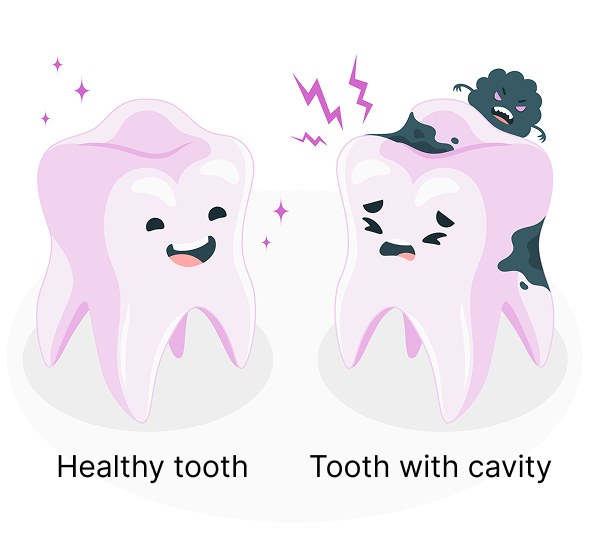Tooth decay in children (also known as early childhood caries) isn’t just a minor inconvenience — it’s one of the most common chronic conditions in childhood. According to the World Health Organization (WHO), signs of cavities in kids are present in 70–80% of children by the age of five.
Even though baby teeth are temporary, treating cavities in children early is essential. It helps ensure proper speech development, healthy bite alignment, and fewer problems with permanent teeth in the future.
Even though baby teeth are temporary, treating cavities in children early is essential. It helps ensure proper speech development, healthy bite alignment, and fewer problems with permanent teeth in the future.
Why Tooth Decay in Kids Is Not “Just a Phase”
Cavities in kids progress much faster than in adults due to thinner enamel and underdeveloped hygiene habits. A small dark spot can turn into severe decay within weeks, requiring professional intervention.
If left untreated, early childhood caries can lead to:
• inflammation of the tooth pulp (pulpitis),
• infection spreading to soft tissue and bone,
• delayed or disrupted eruption of permanent teeth,
• premature loss of baby teeth, which can lead to bite misalignment.
According to international pediatric dental guidelines, any suspicion of tooth decay in children should be examined in person by a dentist, followed by an individual treatment plan. Depending on the stage of decay, treatment may include remineralization therapy or dental fillings.
If left untreated, early childhood caries can lead to:
• inflammation of the tooth pulp (pulpitis),
• infection spreading to soft tissue and bone,
• delayed or disrupted eruption of permanent teeth,
• premature loss of baby teeth, which can lead to bite misalignment.
According to international pediatric dental guidelines, any suspicion of tooth decay in children should be examined in person by a dentist, followed by an individual treatment plan. Depending on the stage of decay, treatment may include remineralization therapy or dental fillings.

How Are Baby Teeth Treated?
Baby tooth cavity treatment is tailored to the child’s age, the extent of the decay, and how the child behaves during the visit. Thanks to modern technology, dental procedures can now be gentle and virtually pain-free.
Dentists may use:
• laser or ultrasonic tools,
• topical anesthetics (gels or sprays),
• drill-free cavity removal for early-stage, superficial lesions.
The key takeaway for parents: don’t delay treatment. The earlier the intervention, the simpler, faster, and safer the process will be.
Dentists may use:
• laser or ultrasonic tools,
• topical anesthetics (gels or sprays),
• drill-free cavity removal for early-stage, superficial lesions.
The key takeaway for parents: don’t delay treatment. The earlier the intervention, the simpler, faster, and safer the process will be.
Cavities in Front Baby Teeth: Why It Happens
Cavities in front baby teeth most often appear between the ages of 1 and 3. This condition, sometimes called baby bottle tooth decay, can result from:
• frequent nighttime bottle feeding,
• sugary drinks or formulas,
• poor oral hygiene after feeding.
• frequent nighttime bottle feeding,
• sugary drinks or formulas,
• poor oral hygiene after feeding.
This type of decay develops rapidly and can affect your child’s appearance, speech, and emotional well-being. Early signs include white spots or darkening of the enamel. Even if your child doesn’t seem to be in pain, it’s important to visit a pediatric dentist — tooth decay in children can be painless in early stages.

When a Baby Tooth Must Be Removed
In some cases, a tooth cannot be saved — for example, when there’s extensive decay, pus-forming infection, or risk to the underlying permanent tooth. In such cases, baby tooth extraction is necessary.
However, removing a baby tooth is not the end of treatment. To avoid bite issues or misalignment, the dentist may:
• install a space maintainer (if the permanent tooth won’t erupt soon),
• recommend regular follow-up visits.
Unmonitored baby tooth removal often leads to overcrowding and may require future orthodontic treatment.
However, removing a baby tooth is not the end of treatment. To avoid bite issues or misalignment, the dentist may:
• install a space maintainer (if the permanent tooth won’t erupt soon),
• recommend regular follow-up visits.
Unmonitored baby tooth removal often leads to overcrowding and may require future orthodontic treatment.
Prevention: How to Avoid Tooth Decay in Children
The best protection is consistent oral care. These simple habits will help maintain your child’s healthy smile:
• Start brushing as soon as the first tooth appears.
• Use a fluoride toothpaste appropriate for your child’s age.
• Limit sugar, especially before bedtime.
• Visit the dentist every six months, even without visible problems.
• Ask your dentist about fissure sealants and fluoride treatments for added protection.
• Start brushing as soon as the first tooth appears.
• Use a fluoride toothpaste appropriate for your child’s age.
• Limit sugar, especially before bedtime.
• Visit the dentist every six months, even without visible problems.
• Ask your dentist about fissure sealants and fluoride treatments for added protection.
Final Thoughts
Tooth decay in children is not a normal part of growing up — it’s a medical condition that requires attention. The earlier you act, the greater the chance of saving the tooth, avoiding complications, and raising a child who’s not afraid of the dentist.
If you’ve noticed a dark spot, mild discomfort, or if it’s been a while since your last visit to a pediatric dentist — don’t delay. Caring for your child’s teeth today means giving them a confident, healthy smile for life.
Regular check-ups help detect cavities three times more often than waiting until pain appears — prevention starts early.
If you’ve noticed a dark spot, mild discomfort, or if it’s been a while since your last visit to a pediatric dentist — don’t delay. Caring for your child’s teeth today means giving them a confident, healthy smile for life.
Regular check-ups help detect cavities three times more often than waiting until pain appears — prevention starts early.
Book a Consultation Today!
📞 Call: +971 55 401 1505 or message us on Telegram/WhatsApp. Find out the exact cost of your treatment and how quickly it can be completed.



